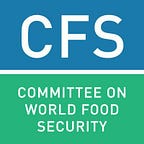Water, water everywhere….
But what about water and food?
Water. What comes into your mind when you hear that word? A nice clean drink of water? The water bubbling out of your shower? A thunderstorm after a dry spell? A lake or sea where you take your vacation?
Perhaps we take water for granted because, for many of the more fortunate, it’s all around us. But we shouldn’t. Every time we sit down to eat, we should be aware of the role water has played bringing food to our plates. With that awareness comes responsibility to ensure water supplies for enough food for future generations.
Water for food security and nutrition
Water contributes both directly and indirectly to food security and nutrition. Safe drinking water and sanitation are fundamental to health, good nutrition and human dignity. 2.5 billion people don’t have access to decent sanitation and 768 million rely on unsafe drinking water sources.
It’s not only their nutrition and health that suffer — their economic and social development is also affected.
Time that could be used productively is taken up by the daily grind of fetching water, something that particularly effects women. Many days are lost to illnesses caused by dirty water and hard earned money is used to buy treatment. This is on top of the human cost and suffering.
Good quality water is also essential for agricultural production and for the preparation and processing of food. Irrigated agriculture accounts for 70% of all surface and groundwater withdrawals globally and 40% of irrigation uses groundwater resources some of which are non-renewable in the human timescale. Reliable irrigation is fundamental to increasing the production of the vast number of smallholder farmers who grow food for their own consumption and for sale.
But the climate is changing…
In the future we can expect changes to water patterns which will affect crops in both rain fed and irrigated systems. Water management will be key to adapting to such changes and can be improved. Both rain fed and irrigated systems need to be more efficient and resilient so that can deal with scarcity. The sustainable management and conservation of ecosystems from the local to the continental level is key to ensuring future supplies of good quality water. Trade can also play a key role by compensating for water scarcities as can state of the art knowledge and new technologies.
Competing for water
Competition between uses is increasing and likely to continue to increase in the future. This includes competition between sectors such as energy, industry, manufacturing and cities all of which put more pressure on the overall water system. With this increased competition, the share of water devoted to irrigation is likely to fall which could have a negative impact on food production.
Reinventing water governance
Given this increased competition and increasing scarcity of water, what can be done? Growing scarcity and competing demands point to the need to reinvent water governance to ensure food security and nutrition. Governance is at the nexus of competing policies, interests and actors from numerous sectors. The Committee on World Food Security (CFS), the UN committee that advises on food security and nutrition policies, endorsed policy recommendations on Water for food security and nutrition in 2015. These policy recommendations are science and evidence based and can be used by governments, civil society, the private sector or anyone working in the area of water use or management.
CFS recommends that inclusive and transparent national and local governance mechanisms are developed to address water use and allocation. They also recommend that effective participation is promoted of all involved when developing policies and mechanisms — whether local or national — for the management and use of water. Water user’s organizations and local communities, particularly indigenous people, should be empowered to participate in decisions on water that affect them. Collaboration on the use of transboundary water basins, lakes, rivers and aquifers should be promoted as well as the full implementation of human rights obligations related to water. Also particular attention should be paid to the direct and indirect effect of large scale land acquisitions on water supplies for people. More CFS policy recommendations on water are here.
Our biggest challenge
Secure access to water is holding back a significant part of the world especially vulnerable populations and will continue to do so. Safeguarding and optimizing the use of water and ensuring stable future supplies is one of the biggest challenges to humanity today.
Water is life — there is no plan B. We should get started.
This article is based on the Committee on World Food Security (CFS) High Level Panel of Experts on Food Security and Nutrition report on Water for food security and Nutrition produced in May 2015.
In 2015 at CFS42 a set of policy recommendations on Water for food security and nutrition were endorsed. These policy recommendations can be used by any stakeholders.
This article was written by Cordelia Salter, CFS Communications Coordinator
